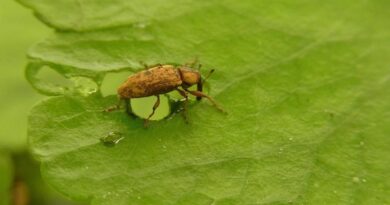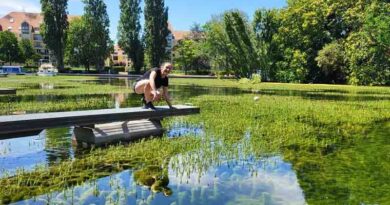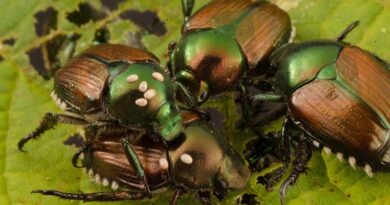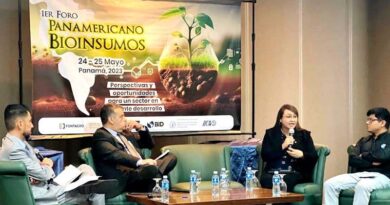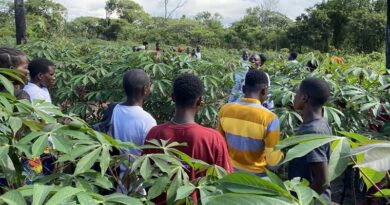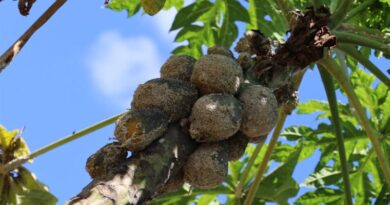CABI’s expertise in biological control of weeds in Latin America highlighted during Science Summit at UNGA78
25 September 2023, US: CABI’s expertise in the biological control of weeds in Latin America has been highlighted during the 9th edition of the Science Summit around the 78th United Nations General Assembly (UNGA78).
This includes the use of Classical Biological Control (CBC) for Invasive Alien Plants (IAPs) such as rubber vine (Cryptostegia madagascariensis) – known in the invaded area in Brazil as ‘unha-do-diabo’ (devil’s claw) and Rubus niveus, (mora silvestre or blackberry) in Galápagos.
Dr Philip Weyl, CABI’s Head of Weed Biological Control in Switzerland, gave a presentation – entitled ‘Rust fungi for the biological control of weeds in Latin America, keeping a foot in the door’ – at the Summit held to address the role and contribution of science to attaining the UN Sustainable Development Goals (SDGs).
The objective of the Summit is to develop and launch science collaborations to demonstrate global science mechanisms and activities to support the attainment of the UN SDGs, Agenda 2030 and Local2030.
The meeting, which Dr Weyl attended virtually, also sought to prepare input for the United Nations Summit of the Future which will take place during UNGA79 on 12 September 2024.
Dr Weyl, who is based at CABI’s Swiss Centre in Delémont, said IAPs can pose a serious threat to food security, biodiversity, human and animal health and economic development around the world.
He stressed that management of these two species addressed is imperative to limit the impact they have on the environment and economy and rust fungi for their biological control may be the answer.
Rubber vine, for example, is known for smothering surrounding plants, including the iconic Carnaúba palm, which is also an important economic plant in the Brazilian state of Ceará as a source for wax.
Meanwhile, blackberry is a threat to native habits in Galápagos. Introduced in 1968, this non-native species is considered one of the worst weeds affecting the islands.
It has now invaded most of the wetter parts of the islands and is estimated to cover more than 30,000 hectares (around 21,500 football pitches). Dense spiny thickets of blackberry can grow up to 3 metres tall. It affects farmland and prevents the unique native forest dominated by the endemic daisy tree from regenerating.
Dr Weyl said, “Once IAPs become broadly established, conventional options such as relying on herbicides and mechanical methods may prove expensive and unsustainable.
“CBC is known to offer the most cost effective and the sole sustainable option and should be considered an essential part of the integrated management strategy for invasive weeds.
“This method relies on reuniting specialist natural enemies from the native range with the respective weed host in its invasive range.
“In order for this to happen in a safe way, many years of research are conducted and once an agent is found and deemed safe for release a Pest Risk Analysis (PRA) is submitted in order to obtain a permit for release.”
In his presentation, which included the input of Professor Robert Barreto, of the Universidade Federal de Viçosa, Brazil, Dr Heinke Jäger, of the Charles Darwin Research Station, Galápagos, and CABI’s Dr Marion Seier, Dr Weyl said that while still poorly explored in Latin America, there has been some successful CBC of weeds.
Dr Weyl added, “Two initiatives are currently underway – for rubber vine and blackberry. The initiative for Brazil is piggybacking on the successful use of the rust Maravalia cryptostegiae to control Cryptostegia grandiflora in Australia.
“Meanwhile, for blackberry, field surveys are still being conducted to identify the most virulent rust species and strains for the weed biotype which is invasive in Galápagos.”
Dr Weyl said once the safety of any selected agent has been demonstrated through host-range testing, the regulatory processes in the respective two countries for the introduction of the selected agent will need to be addressed.
“This presentation gave an overview of the research completed so far and discussed the excellent past record of rust fungi as CBC agents for weeds and their suitability for introduction into both Brazil and Galápagos.
“If implemented these would be the first examples of CBC of IAP in these countries which may open the door for additional CBC projects in the future,” he said.
Also Read: Nirmala Sitharaman launches three key initiatives of the Ministry of Agriculture
(For Latest Agriculture News & Updates, follow Krishak Jagat on Google News)


